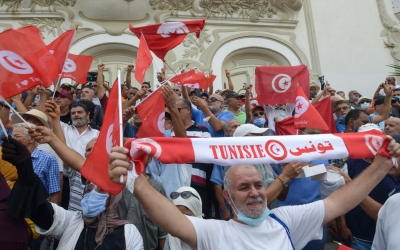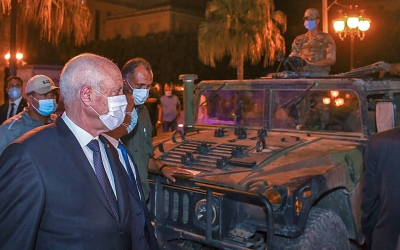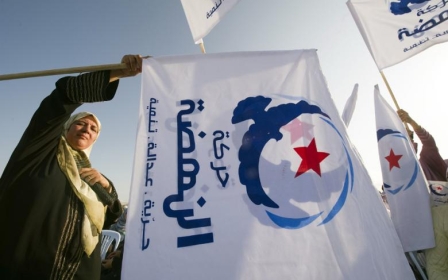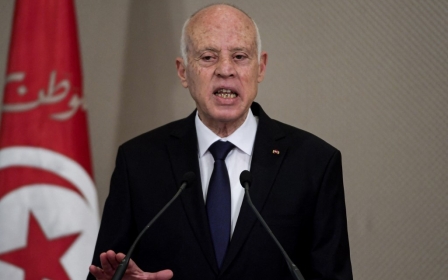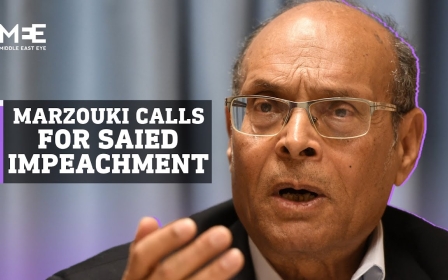US lawmakers call on Biden to determine whether Tunisia crisis constitutes a coup

A group of Democratic lawmakers has asked US Secretary of State Antony Blinken to determine whether Tunisian President Kais Saied's power grab amounts to a coup, and have urged the State Department to take "stronger diplomatic steps" to address the north African country's political crisis.
In a letter made available to Middle East Eye, Representatives Gerry Connolly, Tom Malinowski and Rashida Tlaib claimed Saied was undermining Tunisia's nascent democracy through "the imposition of a manufactured constitutional crisis".
In one of the strongest statements yet by lawmakers in Washington to address the situation, the members of Congress also called for an investigation into whether the government's use of military tribunals to judge civilians was a breach of Tunisian and international law.
The letter also said that Washington must demand that Saied "stop prosecuting, harassing, and restricting the travel of members of parliament and activists engaged in free speech and peaceful protest activities".
In July, Saied suspended Tunisia's parliament, sacked the prime minister and granted himself prosecutorial powers, invoking a national emergency in a move rights groups and political opponents called a coup.
Saied, a 67-year-old constitutional law professor, argued the actions were necessary to address political gridlock, a collapsing economy and a poor response to the coronavirus pandemic.
But Saied's reassurances were thrown into doubt last week when he declared he would rule by decree, as he seeks to amend the constitution and overhaul the country's political system.
Intissar Fakir, director of the Middle East Institute's North Africa and Sahel programme, told MEE that the escalation was "very dangerous" for Tunisia's democracy.
"This has left the realm of what can be defined, even in the most far-fetched of explanations, as constitutional," she added.
'US position has been ambiguous'
Saied has long maintained that he has popular backing and Fakir said he still had support from a large part of Tunisian society frustrated with corruption and falling living standards.
"There is still a lot of support for him on the street and it's becoming more and more organised," she said.
The decision to rule by decree has begun to energise opponents, including some early backers and political allies of Saied, such as the country's powerful Tunisian General Labour Union (UGTT).
But it remains to be seen whether Washington, distracted with the US withdrawal from Afghanistan and trying to extricate itself from the Middle East and pivot towards Asia, is ready to throw its weight behind Saied's opponents.
"The US position has so far been ambiguous," Said Benarbia, director of the International Commission of Jurists told MEE.
"[Washington] insists on the one hand on the need for upholding the rule of law, but refusing, in the other hand, to make a determination about Saied's actions, the extent to which they undermine the rule of law and whether they amount to a coup," he added.
Top lawmakers in the powerful Senate Foreign Relations Committee issued a bipartisan warning in August about instability in Tunisia stemming from Saied's actions. And over the summer, the Biden administration dispatched its deputy national security advisor to the country to urge Saied to restore the country’s parliamentary democracy.
But Washington has stopped short of calling Saied's actions a coup.
A source in the US Senate with knowledge of the matter told MEE in August that they didn't believe State Department lawyers were willing to make such a decision.
Slashing aid would be 'catastrophic'
In their letter to Blinken, the congressional lawmakers asked for a determination on “whether President Saied’s actions are in violation of any US aid requirements, and, if so [to] freeze US military aid to Tunisia until democratic governance has been restored”.
Such as decision would likely have serious ramifications for Tunisia, which is heavily in debt and reliant on nearly $7bn in loans to fund its $19bn 2021 budget.
Since the Arab Spring, the US has supported the country with infusions of aid, contributing more than $1.4bn evenly spaced out between economic and security assistance.
The United Nations Agency for International Development (USAID) alone has sent nearly $685m to Tunisia since 2011. That support has continued unabetted. Washington's main subcontractor in Tunisia, DC-based development firm Chemonics, is still operating a $70m jobs project there.
Likewise, there have been no announcements on whether the Biden administration plans to go ahead with a nearly $500m development fund approved for the country in July.
Declaring Saied's actions a coup would lead to a suspension of aid at a difficult time for the country.
Tunisia's tourism sector was battered by the coronavirus pandemic and the country's GDP shrank almost nine percent in 2020, plus unemployment increased from 15 percent to 18 percent, according to the World Bank.
Fakir says the move would be "really catastrophic for Tunisia" but might not lead to any real change, adding "it could galvanise Saied's supporters even more".
MEE reached out to the United Nations Agency for International Development (USAID) to determine if a review of its aid policy to Tunisia was taking place and was referred to the State Department. A spokesperson said, "The United States is committed to supporting the Tunisian people and Tunisia’s democratic and economic development, as well as providing COVID-related aid."
"We are continuing US programmes that are helping Tunisians stabilise the economy and confront the COVID-19 pandemic," the spokesperson added.
Rights groups such as the Project on Middle East Democracy have called for the suspension of military aid to Tunisia as one way to get Saied to change course. Those calls were echoed by lawmakers in their letter to Blinken and by an opinion piece written by Senator Chris Murphy.
Murphy said on Monday that the US "must continue to support the Tunisian people with aid, but until democracy is restored, we must reconsider our security assistance package to Tunisia".
Tunisia is a crucial partner in US counterterrorism operations and has suffered from a string of terrorist attacks in recent years. In 2020, the country received $85m in foreign military financing from the US.
Tunisia's military has so far stood behind Saied. Fakir said she doubts the Biden administration would pull assistance, but even if it did, she was unsure "if that would be enough for them [the military] to withdraw their support [of Saied]."
Middle East Eye delivers independent and unrivalled coverage and analysis of the Middle East, North Africa and beyond. To learn more about republishing this content and the associated fees, please fill out this form. More about MEE can be found here.


